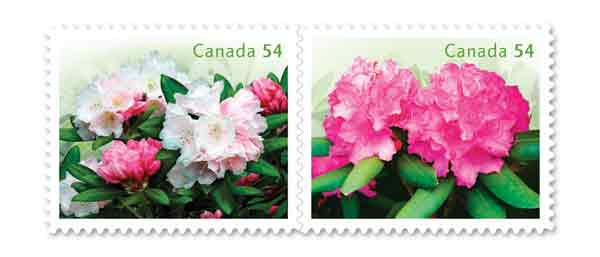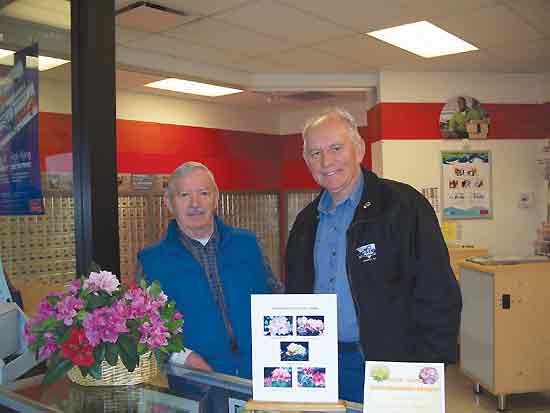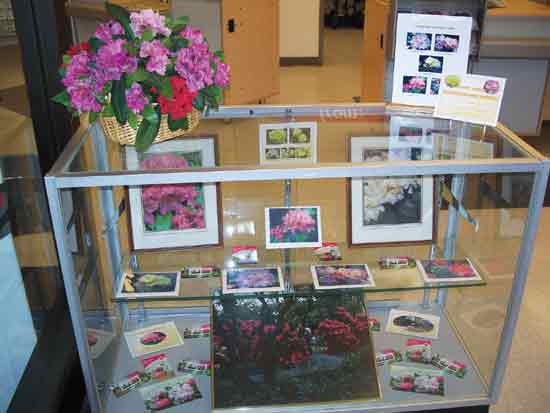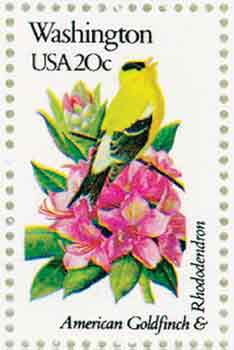JARS v63n3 - Rhododendrons Recognized on Canadian Stamps
Rhododendrons Recognized on Canadian Stamps
Canada Post's release of stamps of rhododendrons resulted in a number of Newsletter articles, two of which resulted in the following submissions to JARS.
The Rhodoteller
North Island Chapter Newsletter
Dave Godfrey
Courtenay, British Columbia, Canada
The Rhododendron genus was recently given national recognition when Canada Post welcomed spring by issuing two new stamps featuring rhododendron trusses. On March 13, 2009, Canada Post released stamps and postcards of R. yakushimanum 'Mist Maiden' and R. 'Minas Maid'. With beautiful foliage and stunning flowers, these two rhododendrons have caught the attention of gardeners across the country. 'Mist Maiden' is one of the larger forms of R. yakushimanum selected by the well known rhododendron authority David Leach. Since introduced in 1943, the seedling selection 'Mist Maiden' has been crossed with other species and hybrids. 'Minas Maid' ('Nova Zembla' x R. degronianum ssp. yakushimanum;), with its vibrant pink flowers and dark green foliage, was bred by George S. Swain in 1966, was raised by Swain and Dr. D. L. Craig at the Research Station in Kentville, Nova Scotia, and then was named and introduced by Dr. Craig in 1979. Sturdy, reliable and easy to grow, these two featured rhododendrons have become garden favourites.
 |
| R. degronianum ssp. yakushimanum; 'Mist Maiden' (left) and R. 'Minas Maid'. |
As they do for many new stamp releases, the main post office in Courtenay, BC, wanted to create a display to promote these magnificent new stamps, and contact was made with the North Island Rhododendron Society (NIRS) of the ARS to provide related materials. Realizing the benefits of promoting both the stamps and their ARS Chapter, members were only too pleased to help.
 |
 |
|
| Harry Wright and
Dave Godfrey at the North Island Chapter stamp display. Photo courtesy of Dave Godfrey |
The North Island
Chapter stamp display. Photo courtesy of Dave Godfrey |
NIRS founding member and past President Harry Wright and Director Dave Godfrey
designed the display, featuring artwork and cards provided by Harry. A hybridizer
of international recognition, Harry has created the Courtenay Five series of
rhododendrons ('Courtenay Queen', 'Courtenay King', 'Courtenay Princess',
'Courtenay Duke' and 'Courtenay Lady') and has them featured on gift cards
which were used in the display. Emphasis was given to R. 'Courtenay Lady' which
has been adopted as the official plant by the City of Courtenay. The vibrant
display greeted visitors to the main post office and highlighted the beautiful
new stamp set that was available.
As we move into spring and look forward to the blooming season of our nation's
rhododendrons, we were delighted to have Canada Post feature our favourite
genus!
Tappan Zee Chapter Newsletter
Gus Cerini, Newsletter Editor
Pearl River, New York
[The release of rhododendron stamps by Canada Post] prompted me to search for the depiction of rhododendrons on United States stamps. The only instance I could find was the 1982 State Bird and Flower Sheet featuring fifty, 20-cent stamps, each one picturing a state's official bird and wildflower. The Washington stamp depicted the American Goldfinch (Carduelis tristis) and the coast rhododendron (R. macrophyllum).
 |
| Washington state stamp. |
In 1892, Washington women selected the coast rhododendron as the state flower,
so that they could have an official flower to enter in a floral exhibit at the
1893 World's Fair in Chicago. An interesting account of this election is described
below (modified by the JARS Editor).
If anyone knows of another US stamp featuring a rhododendron, please let me
know.
Washington, the Evergreen State's Official "Coast Rhododendron"
Conceived as a way to celebrate the 400th anniversary of Columbus' voyages
to the "new world," the 1893 World's Columbian Exhibition held in Chicago
provided the venue for a unique trend that continues to this day, the
designation of symbols and emblems as defining characteristics of each state.
It was the Women's Congress that came up with the idea of a "National Garland
of Flowers" at the fair comprised of a representative flower from each state.
Inspired Washingtonians picked up the gauntlet and began the process of naming
a flower to represent their state in the National Garland of Flowers. Many
flowers were considered including the dogwood, Syringa, Gaillardia, Washington
holly, marguerite, and the wild rose.
Washington poet laureate Ella Higginson of Bellingham suggested that the
clover would be ideal. Alsora Hayner Fry was a fan of the coast rhododendron
and nominated it in Washington newspapers. In Spokane, some women thought that
the symbolism of the stylized iris known as the fleur-de-lis (French: flower
of the lily) would serve the state well and The Spokane Times concurred. Two
flowers emerged to contend for the title perhaps because of their champions. The
clover and rhododendron, or "rhodie," were to go head to head in statewide
voting only open to women.
The campaigning began in earnest. Mrs. Fry's rhododendron with its "wild
profusion, great beauty and its evergreen leaf, which goes with the Evergreen
State" was denigrated as imported from California. Rhodie supporters attacked the
clover as cattle forage.
Voters flocked to post offices, drugstores, hotels, and other public business
places to cast their ballots for the official state flower. There were no
landslide victories in this contest. In the end, the coast rhododendron was favored
by capturing 53% of the 15,000 ballots cast.
The Washington Senate took action and approved Mrs. Fry's coast rhododendron as
the official state flower on February 10, 1893, in time for the Exposition's
opening on May 1st.
The World Almanac and Book of Facts of 1931 names the rhododendron as Washington's
state flower selected by the people, but only one half of the Washington Legislature
actually approved the rhododendron to represent the state. Sixty-six years later
to the day, on February 10, 1949, the rhododendron (Rhododendron californicum)
was approved by both houses as the official flower of Washington.
In 1959, the law was amended, through the efforts of Mr. Leonard Frisbie, to
specify Rhododendron macrophyllum as the specific variety of rhododendron
intended to represent Washington State.